11 Remedies To Heal Dry Skin Around The Nose & Prevention Tips
Get plump and soft skin around your nose with effective and simple remedies.
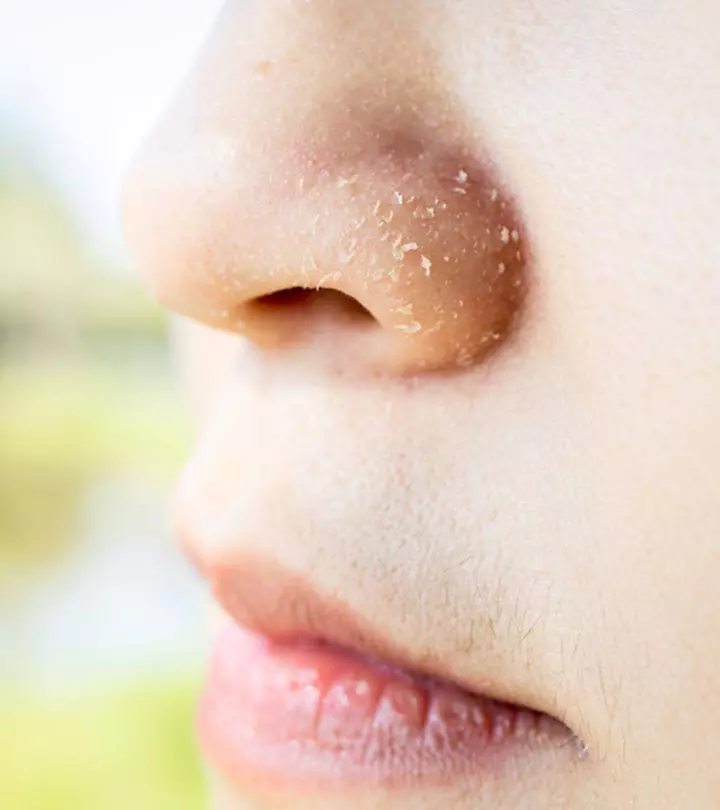
Image: Shutterstock
Dry skin around the nose is a common but bothersome condition that affects many people. If you stick to the fundamentals of skin care, you are probably moisturizing your face twice a day. However, while the rest of your face remains smooth and plump, sometimes dry skin can be persistent around the nose. Even if you use the best facial moisturizers, the skin around your nose may remain dry, scaly, and irritated. So let’s look at the numerous factors that can cause this and discover simple but effective treatments to treat it. Keep scrolling!
In This Article
5 Causes Of Dry Skin Around The Nose
Dry and flaky skin around the nose is often considered a symptom of cold, harsh winters. Indoor heating during winter months can also dry out the air and strip your skin of its natural moisture. This lack of humidity can lead to dry, flaky skin around the nose and other areas, making it harder to maintain skin hydration during colder months. However, many people experience this condition even in the summer, hinting at underlying issues. So let us take a look at a few common causes of dry skin around the nose for a better understanding.
1. Underlying Skin Conditions
If the skin around your nose is constantly flaky, dry, and itchy, it is possible that you have an underlying skin condition like seborrheic dermatitis.
Seborrheic dermatitis can lead to white, powdery or yellow, greasy scaling, and redness on many facial sites, including the creases around the nose (1). This is one of the most common causes of localized dryness on the creases of the nose.
A study showed that dry skin might be a predictor for other underlying skin conditions. Of the 48630 participants, 14300 (29%) had dry skin issues. The study also suggested that older age was associated with dry skin. Xerosis is a significant predictor for atopic eczema, exsiccation eczema, psoriasis, plantar warts, and seborrhoeic dermatitis.
2. Environmental Factors

The environment you live in has a major impact on your skin health. Exposure to environmental pollutants like dust, debris, and chemicals, changing weather conditions, and, most commonly, UV rays can cause serious skin issues in people, especially those with fair and/or sensitive skin (2). A sunburn, or decades of sun exposure, on your nose may cause dry, flaky spots on the nose that just don’t go away, which can lead to more serious problems if untreated. These spots tend to be small and remain constant or always recur in the same location.
3. Allergies Or Colds
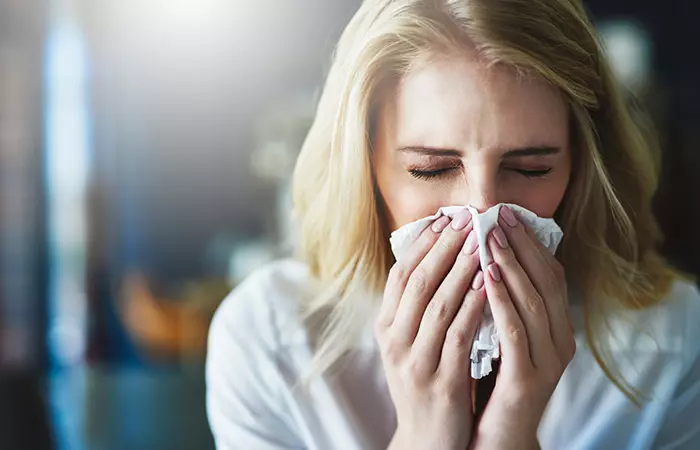
While allergies and colds can strike at any time of the year, they are more likely to flare up during the colder months. Constantly blowing your nose and wiping it with a tissue can leave the skin around it reddish and sore. Lots of nose blowing can irritate the delicate skin around the nose and make it more susceptible to drying and peeling.
4. Skin Care Products
The products you use on your skin can be detrimental to its health if not chosen carefully or used properly. Harsh ingredients in products like face washes, scrubs, and exfoliating creams can dry out your skin, leading to inflammation and irritation.
Some anti-acne products, such as salicylic acid, benzoyl peroxide, retinol, adapalene, and tretinoin, can strip away the moisturizing oils from your skin leading to skin irritation. This leaves it dry and flaky, especially around the nose. Using products with ingredients that you may be allergic to can also lead to similar problems, although this tends to itch.
5. Dehydration
Not drinking enough water has an impact on your overall health, including your skin.
If your water intake is low for a few days, it is less likely to affect your skin. However, remaining dehydrated for long periods of time can lead to dry, dull skin. For those prone to dry skin around the nose, general dehydration can cause the issue to flare up, but this is rarely the cause of localized skin dryness.
Now that you know what can cause dry skin around the nose, let us look at a few remedies to heal the same.
Key Takeaways
- Underlying skin conditions, environmental factors, allergies, dehydration, and harmful ingredients in skin care products can cause dry skin around the nose.
- You can use products with glycerol to soothe dryness, flakiness, and itchy skin as it possesses antimicrobial properties.
- Include lots of fresh fruits and vegetables in your diet to keep your skin soft and healthy.
11 Effective Tips And Remedies To Heal Dry Skin Around The Nose
Experiencing dry skin around the nose can be quite distressing, but this condition is usually treatable with some simple tips and remedies. Dr. Nadir Qazi, a board certified physician, says, “Flaky, dry, and itchy skin around the nose can be treated and prevented through constant hydration, moisturizing, and using shea butter and jojoba oil. Drinking water keeps the skin hydrated. Moisturizers eliminate dry skin and give it a smooth, appealing appearance because the cells are plump and happy with hydration. Products like shea butter and jojoba oil are non-comedogenic and balance the skin’s natural oil with rich antioxidants of vitamin E to keep moisture locked in and pores unclogged.” Explore these easy and effective options to heal dry, peeling skin.
1. Stop Using Harsh Products
Develop a habit of reading the ingredient lists of all the skin care products you buy. Some beauty bloggers feel that products with irritating or exfoliating ingredients like scrubs, alpha hydroxy acids, retinol, or alcohol-based products can make the delicate skin around your nose dry and flaky. They also recommend ditching facial scrubs.
Always do a small patch test while trying a new product and be extremely careful when it comes to the creams, lotions, and face washes you use. For those with normal or dry skin, avoid irritating or drying products.
2. Use Products With Glycerol
To soothe dry, flaky skin, use creams with nourishing ingredients like glycerol. It is a hydrating substance that forms a protective barrier on the skin and helps lock in the moisture. Glycerol also has antimicrobiali Often used in medication, it is the potential of a substance to prevent or kill microorganisms in humans and plants. properties and accelerates the process of wound healing, thus giving you relief from itchiness and redness (3). You can also buy pure glycerol and use it to make DIY moisturizers and serums. When the humidity levels drop in the air, the skin tends to get drier, and moisturizing becomes even more important.
Ramya, a blogger specializing in natural beauty treatments and remedies, discloses her approach to combating dry skin. She recommends, “Every night, just before going to bed, I apply a few drops of glycerin with one drop of rose water to my face and neck using a cotton ball. By morning my skin feels so supple and baby soft. I would recommend using just a little quantity on the face so that it can be absorbed easily as glycerin can be a little sticky and messy. I have also noticed that by morning, all the fine lines and wrinkles on my face have also disappeared!! (i).”
3. Stay Hydrated

As stated earlier, general dehydration over a prolonged period can make your skin more prone to developing skin conditions. Ensure you drink adequate amounts of fluids, especially if you live in arid regions known for their harsh summers.
4. Use A Nasal Spray For Allergies And Colds
Constantly blowing your nose and wiping it with tissues can leave the skin on and around it tender and sore, making it dry and more prone to peeling. Use a suitable nasal spray to manage your allergies and decongest your nose so that you don’t have to blow your nose often. Always consult a doctor in case of severe allergies, and do not self-medicate.
5. Invest In A Humidifier
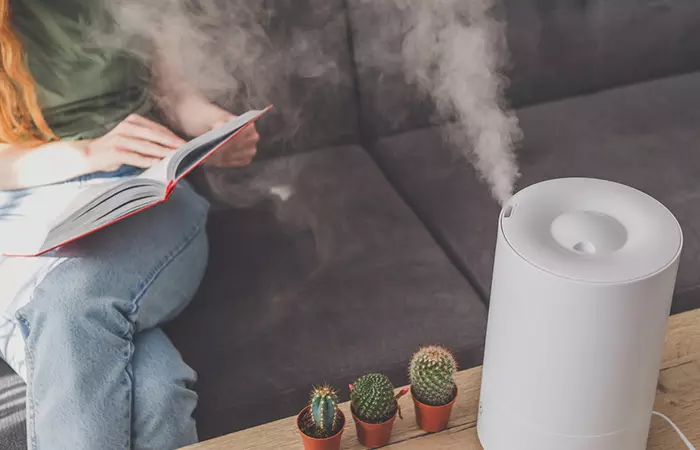
For those living in arid regions where the air is dry and the humidity is low, it is a good idea to invest in a humidifier. Harsh weather conditions in such regions can wreak havoc with your skin and lead to multiple skin issues, including dry skin around the nose.
A humidifier will keep the air inside the house moist and help alleviate the symptoms of allergies. It will also help your skin stay hydrated and protect it from getting chapped due to the heat.
 Quick Tip
Quick Tip6. Use Products With Hyaluronic Acid (HA)
Chronically dry skin is damaged skin. To heal the dry, flaky skin around your nose, you need to pamper it with moisturizing and nourishing products.
Hyaluronic acid (HA) is one such ingredient known for its regenerative, wound healing, and anti-inflammatory properties that can help reduce dry skin (4). It pulls water from the air to hydrate the skin. Therefore, it should be used only when in humid environments. Gels, creams, lotions, and serums with HA are easily available in the market.
7. Use Sunscreen
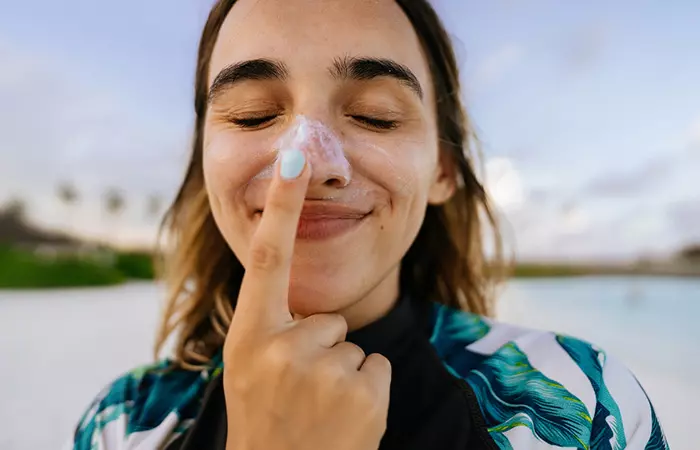
The sun’s harmful UV rays and other environmental pollutants can be a major factor contributing to dry skin around the nose and mouth. Sunburns on the area near the nose can exacerbate into painful bumps and powdery scales if left untreated. Use a broad-spectrum sunscreen every time you step out to protect your skin against sunburns (5). Any existing damage, such as pre-cancerous growths or skin cancer, will not go away with sunscreen, but regular sunscreen use will reduce the risk of further damage.
8. Revamp Your Diet
What you eat has a direct impact on your skin health. To keep your skin supple and ward off dryness, consider consuming foods rich in antioxidantsi A substance with the potential to tackle free radicals in the body, thereby preventing any cell damage or disease. and omega-3 fatty acids.
Flax seeds, hemp seeds, and chia seeds are a few rich sources of omega-3 fatty acids that hydrate and soften your skin if consumed regularly. Flaxseed oil, especially, has been shown to reduce skin scaling, skin roughness, and dryness (6). Also, don’t forget to include loads of fresh fruits and vegetables in your diet.
9. Pamper Your Skin More In The Winters
During winters, your skin loses moisture easily and can become itchy and flaky if you do not protect it. If you have dry skin around the nose, your issue will likely become more severe in the dry winter weather.
Ensure that you take good care of your skin and health in general when it is colder. Eat nourishing foods and drink lots of warm herbal teas to soothe your throat and keep allergies at bay. Pamper the skin around your nose with rich, moisturizing creams to prevent it from drying out.
10. Use Natural Remedies
Plant oils like coconut oil, jojoba oil, almond oil, olive oil, and sesame oil have anti-inflammatory and antioxidant properties that are good for repairing the skin barrier and promoting healing (7).
Wash your face with lukewarm water and a mild cleanser. Pat, it dry and massage a few drops of any of these oils on the skin around your nose to keep it soft and smooth.
 Quick Tip
Quick Tip11. Oatmeal Bath
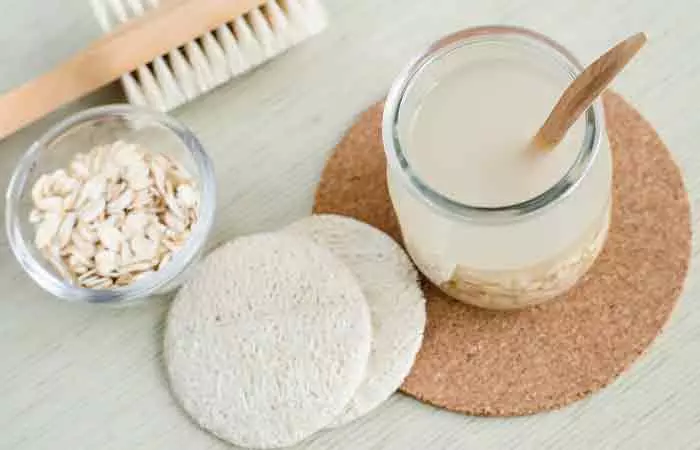
Oatmeal baths have often been a popular choice for centuries for treating dry, broken, and irritated skin, and even severe skin conditions like eczema. Colloidal oatmeal has an abundance of antioxidants, and it exhibits anti-inflammatory properties that soothe skin irritation (8). While the bath is often beneficial when soaked through the whole body, you can apply the water to your face, particularly the area around your nose, and leave it on for 10 to 15 seconds then repeat a few times. To make the bath, simply grind the oatmeal to get a fine powder and mix it into a warm water bath.
There are many remedies for treating dry skin around the nose. However, how long do you need to wait before seeing visible improvement? Find out below.
How Long Does Dry Skin Around The Nose Take To Heal?
Unless the dry skin and flaky scales on the skin around your nose are caused by an underlying medical issue, you can expect to see visible improvement within 8-10 days of using the right products.
For sustained improvement in your skin condition, continue the treatment regularly for at least 3-4 months. Be sure to adopt a holistic, healthy lifestyle as well.
In case your problem is chronic and/or recurs, it may be the result of an underlying medical condition, and only your doctor can advise you about the right treatment. In this case, it may take a few months to see visible results.
As you can see, there is a lot one can do to eliminate dry skin and prevent it from getting worse. The above-listed tips for dry skin around the nose can help reduce discomfort and get your skin back in top condition.
There are a few things you can do to prevent dry skin around your nose. Check them out in the next section.
10 Easy Tips For Preventing Dry Skin Around Your Nose
Taking a few precautions can help you keep the skin around your nose from drying out and becoming itchy. Here is what you need to keep in mind.
- Don’t use face powder if the skin around your nose is prone to drying out.
- Avoid taking showers that are longer than 15 minutes as it can dry out your skin.
- Use lukewarm water while showering as hot water can make your skin dry.
- Use sunscreen with a high SPF if you are spending time near reflective surfaces such as water, snow, or ice.
- Remember that some medications can make your skin more sensitive to sunburn, causing dry skin around the nose.
- Use a moisturizing facial mist regularly to keep your skin hydrated.
- Avoid frequent exfoliation or using irritating products.
- Use gentle, pH-balanced skin care products.
- Adopt a healthy lifestyle for overall better skin health.
- Don’t forget to remove makeup with an oil-based makeup remover and thoroughly cleanse your face before sleeping.
Infographic: Oatmeal & Honey Mask For Dry Skin Around The Nose
Dry skin around the nose can be irritating and ruin your makeup look. From environmental factors to dehydration, there are several factors that can cause dry skin in that area. However, there are several home remedies that may help heal your skin and moisturize the affected areas. Check out the infographic below to learn how to prepare a DIY oatmeal honey mask to manage this condition. Illustration: StyleCraze Design Team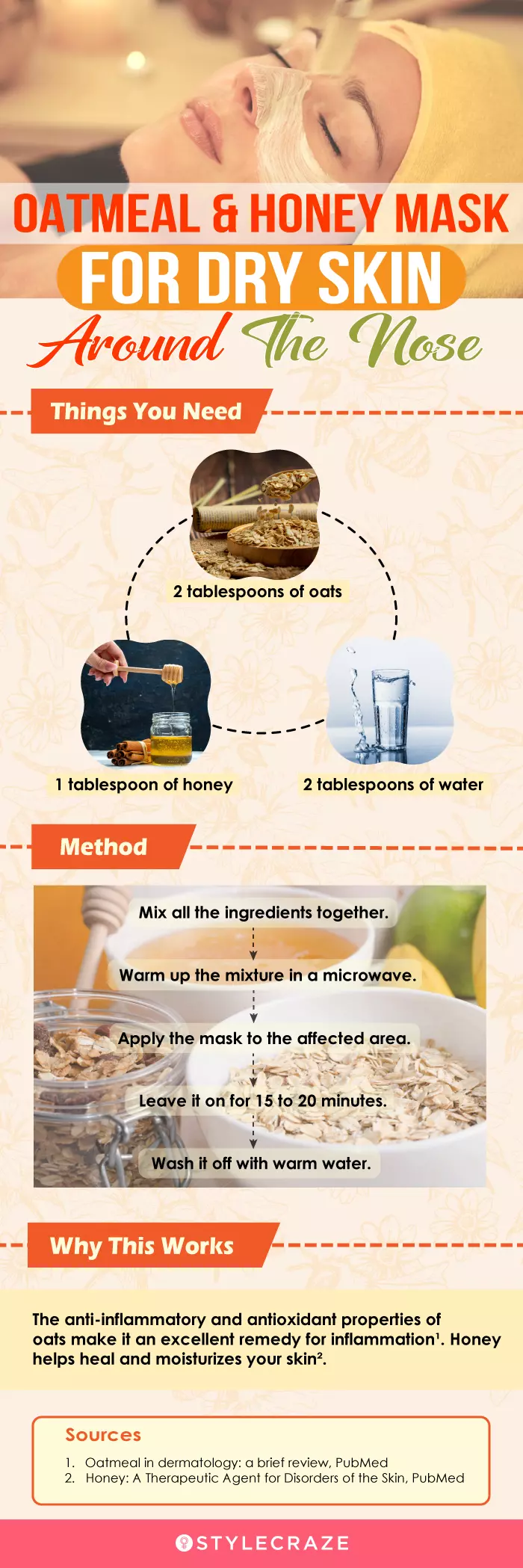
Exposure to environmental triggers, colds, allergies, or an underlying medical condition can result in dry skin around your nose. While dry and peeling skin can be distressing, it can be easily treated with some simple remedies at home. Investing in a humidifier, drinking plenty of water, and using coconut or jojoba oil can improve skin barrier function and treat the dry skin around nose. While it may take a few days for the dry skin to heal, adopting a healthy lifestyle and using the right skincare products can improve your overall skin health.
Frequently Asked Questions
What should you do if dry skin persists?
Dr. Qazi advises to visit a doctor if dry skin persists. He adds, “All skin types are different. What works for one may not work for all. If the skin is warm to the touch, burns, or is stretched to the point of cracking, you should consult with a doctor to see the next steps.”
Does Vaseline help dry skin?
Yes, vaseline is a good moisturizer that can help dry skin lock in moisture.
How do you fix the redness around your nose?
This depends on the cause of the redness around your nose. If it is due to weather or sunburn, you can use gentle moisturizers around your nose. If the redness is due to a skin condition or infection, consult your doctor for further treatment.
Can you put Vaseline on the outside of your nose?
Yes, you can use Vaseline on the outside of your nose. Ensure that you do not use Vaseline inside your nose.
Dry and flaky skin around the nose can be itchy and embarrassing. Learn about the causes and simple tips to treat this condition by watching this video.
Personal Experience: Source
StyleCraze's articles are interwoven with authentic personal narratives that provide depth and resonance to our content. Below are the sources of the personal accounts referenced in this article.
i. Glycerin magic!!https://prettysutra.wordpress.com/2016/08/27/glycerin-magic/
References
Articles on StyleCraze are backed by verified information from peer-reviewed and academic research papers, reputed organizations, research institutions, and medical associations to ensure accuracy and relevance. Read our editorial policy to learn more.
- Seborrheic Dermatitis And Rosacea
https://www.rosacea.org/patients/seborrheic-dermatitis - Skin diseases associated with environmental factors
https://pubmed.ncbi.nlm.nih.gov/28516256/ - Glycerol and the skin: holistic approach to its origin and functions
https://pubmed.ncbi.nlm.nih.gov/18510666/ - Hyaluronic acid
a promising skin rejuvenating biomedicine: A review of recent updates and pre-clinical and clinical investigations on cosmetic and nutricosmetic effects - Sunscreens: are they beneficial for health? An overview of endocrine disrupting properties of UV-filters
https://pubmed.ncbi.nlm.nih.gov/22612478/ - Diet and Skin Barrier: The Role of Dietary Interventions on Skin Barrier Function
https://www.ncbi.nlm.nih.gov/pmc/articles/PMC7875671/ - Anti-Inflammatory and Skin Barrier Repair Effects of Topical Application of Some Plant Oils
https://www.ncbi.nlm.nih.gov/pmc/articles/PMC5796020/ - Anti-inflammatory activities of colloidal oatmeal
https://pubmed.ncbi.nlm.nih.gov/25607907/
Read full bio of Dr. Robert S. Bader
- Dr. Nadir Qazi, DO, has over 6 years of experience in cosmetic dermatology and plastic surgery. He is a member of the American Academy of Cosmetic Surgery and an instructor for advanced injections and laser techniques. He is well-known among celebrities and elite models for his promising liposuction results and his innovative facial contouring technique known as the HD Lift™.
 Dr. Nadir Qazi, DO, has over 6 years of experience in cosmetic dermatology and plastic surgery. He is a member of the American Academy of Cosmetic Surgery and an instructor for advanced injections and laser techniques. He is well-known among celebrities and elite models for his promising liposuction results and his innovative facial contouring technique known as the HD Lift™.
Dr. Nadir Qazi, DO, has over 6 years of experience in cosmetic dermatology and plastic surgery. He is a member of the American Academy of Cosmetic Surgery and an instructor for advanced injections and laser techniques. He is well-known among celebrities and elite models for his promising liposuction results and his innovative facial contouring technique known as the HD Lift™.
Read full bio of Arshiya Syeda
Read full bio of Ramona Sinha
Read full bio of Monomita Chakraborty








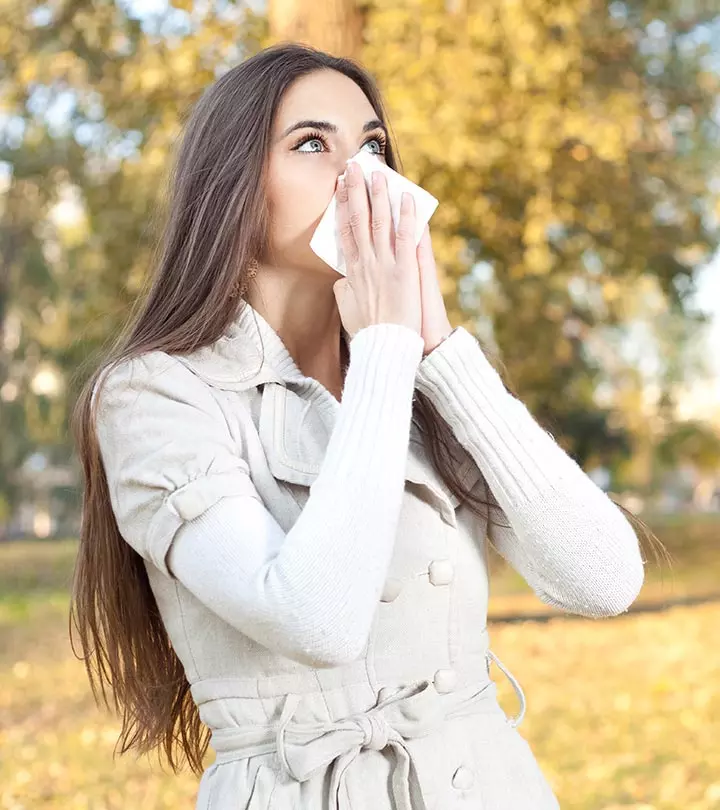
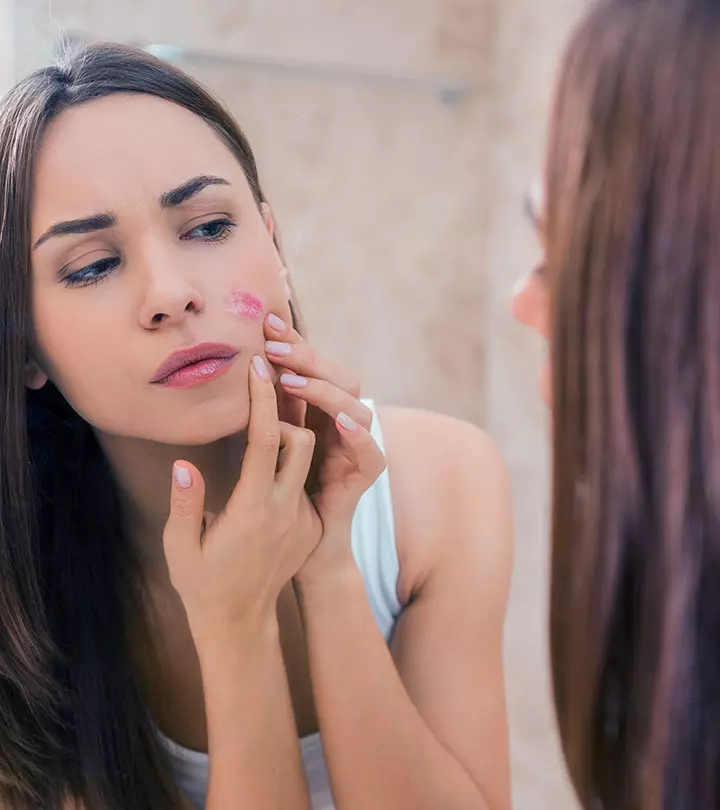

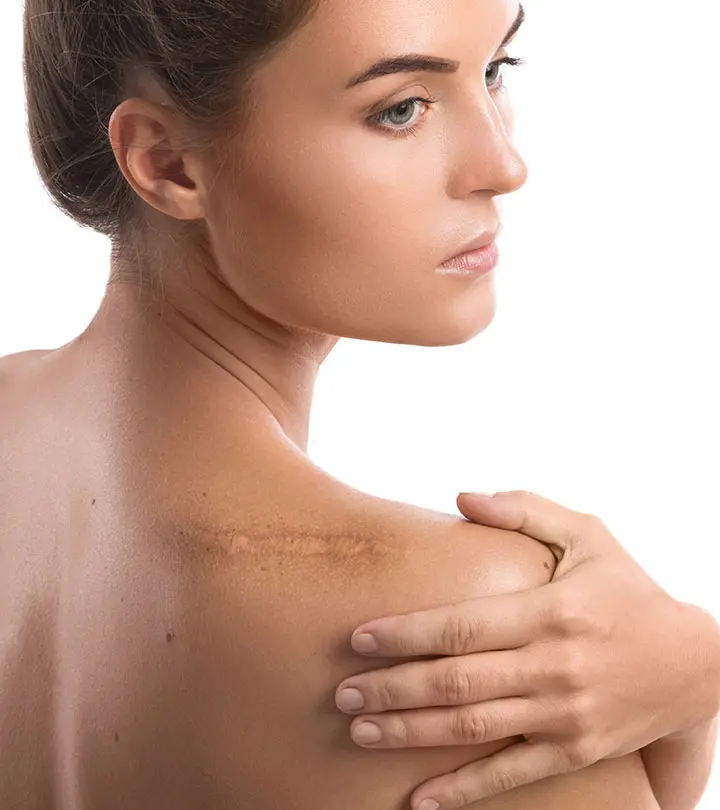




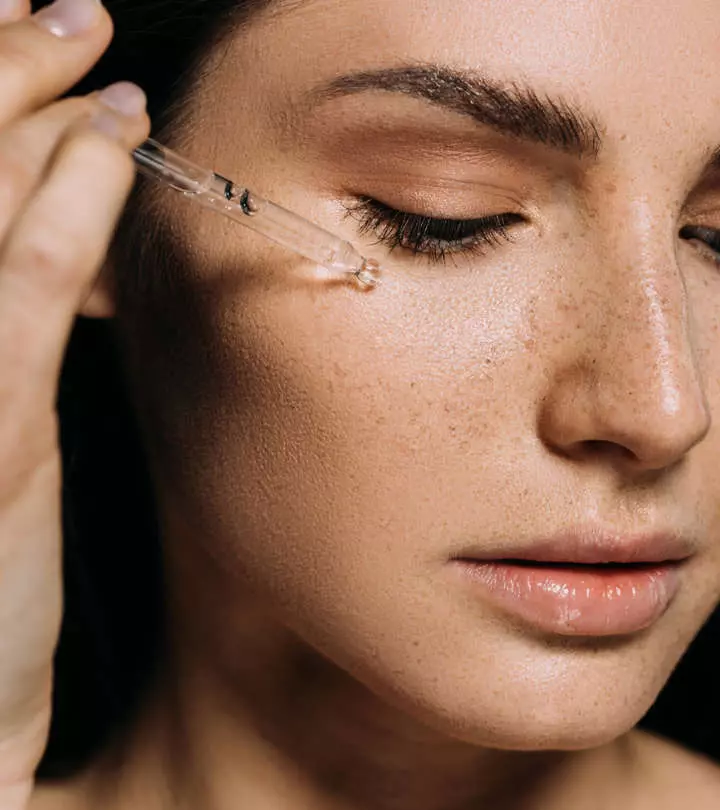

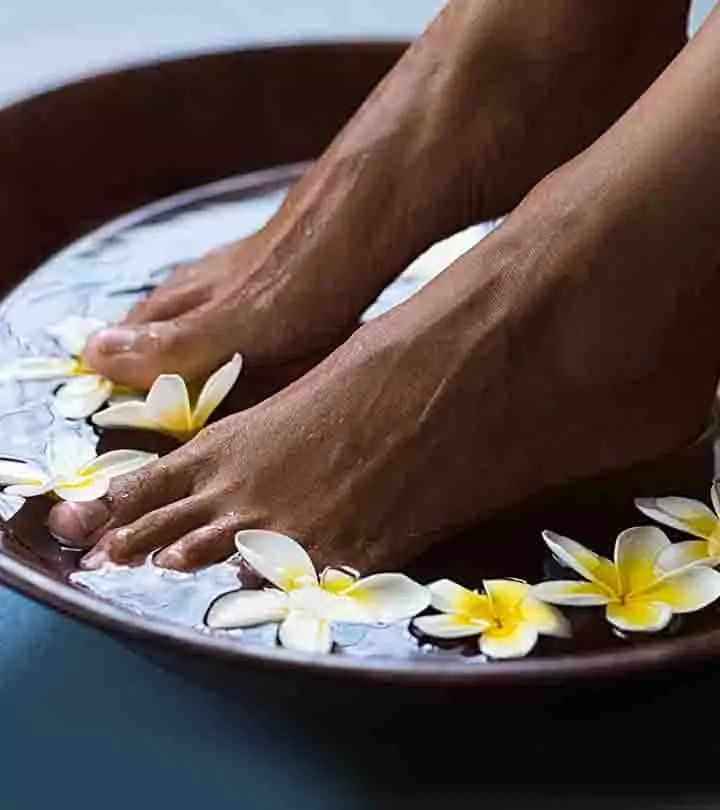


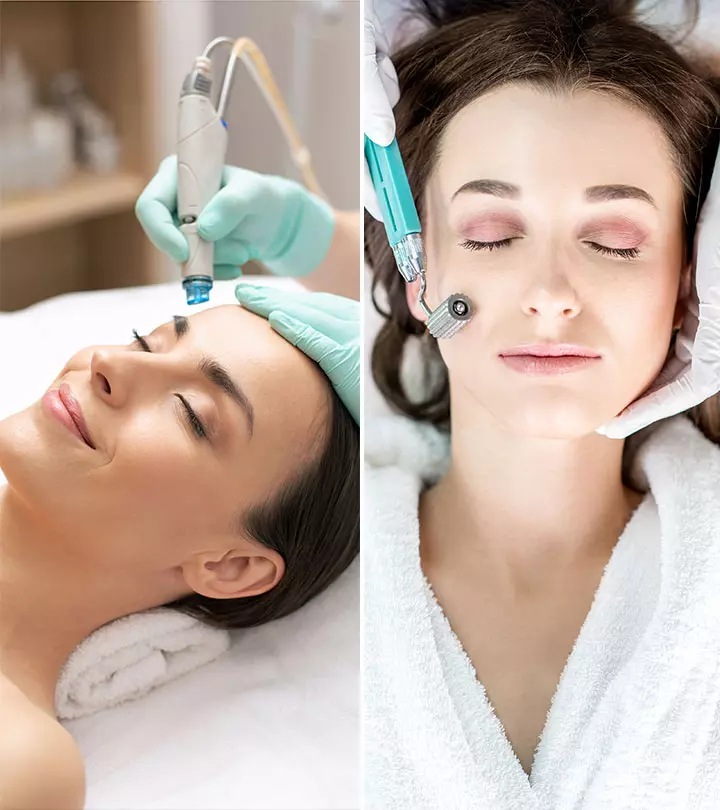
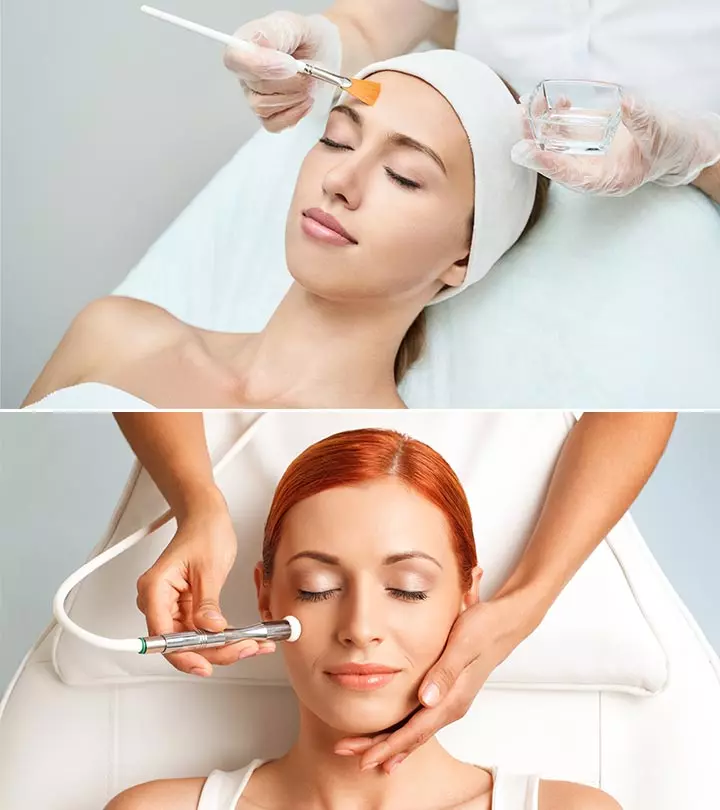
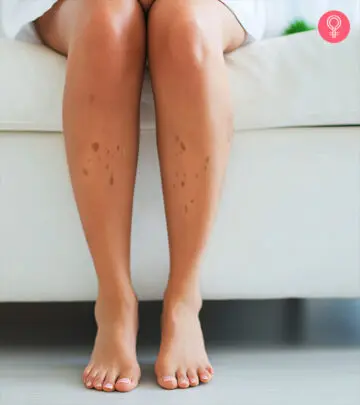




Community Experiences
Join the conversation and become a part of our empowering community! Share your stories, experiences, and insights to connect with other beauty, lifestyle, and health enthusiasts.